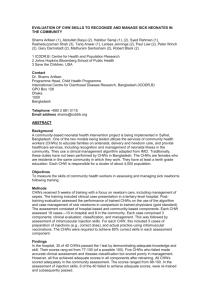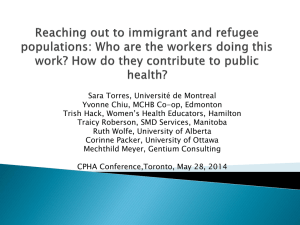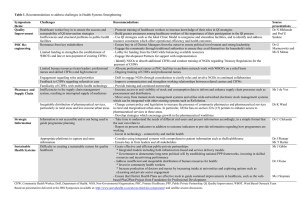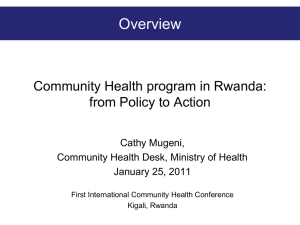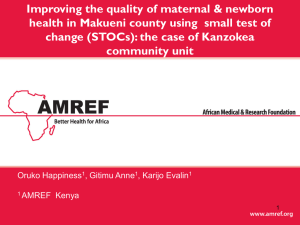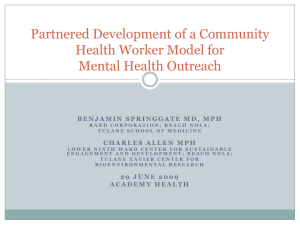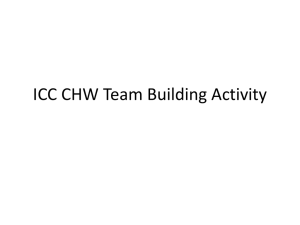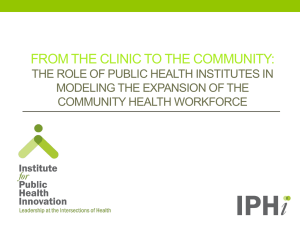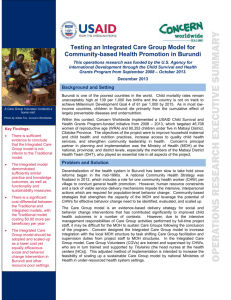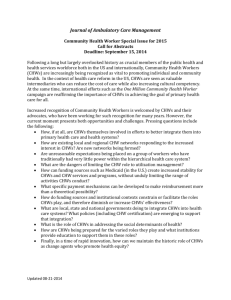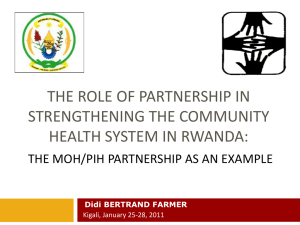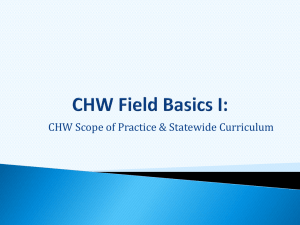Community Health Workers
advertisement
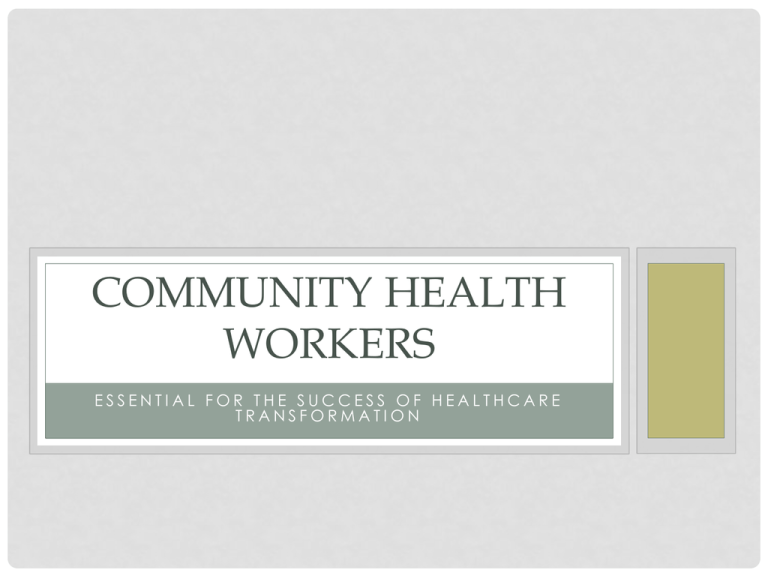
COMMUNITY HEALTH WORKERS ESSENTIAL FOR THE SUCCESS OF HEALTHCARE TRANSFORMATION WHO ARE COMMUNITY HEALTH WORKERS (CHWS)? APHA DEFINITION • Community Health Workers (CHWs) are frontline public health workers who are trusted members of and/or have an unusually close understanding of the community they serve. This trusting relationship enables CHWs to serve as a liaison/link/intermediary between health/social services and the community to facilitate access to services and improve the quality and cultural competence of service delivery. CHWs also build individual and community capacity by increasing health knowledge and self-sufficiency through a range of activities such as outreach, community education, informal counseling, social support and advocacy. (American Public Health Association, 2008) HISTORY IN OREGON • 1960s: Indian Health Service Community Health Representative (CHR) program begins nationwide. • 1970s: Outreach workers are hired at Kaiser Neighborhood Health Clinic in Portland. • 1988: Doctors at La Clínica del Cariño in Hood River found the El Niño Sano Program. • 1995-1998: CHWs and allies from Oregon are at the forefront of the Natl. Community Health Advisor Study, the first national policy study about CHWs. HISTORY CONTINUED • 2002: The Multnomah County Health Dept. establishes the Community Capacitation Center to provide credit-bearing training for CHWs. • 2002-2005: Poder es Salud/Power for Health is funded by the Centers for Disease Control and Prevention. • 2011: • • • HB 3650 - Requires State to establish criteria, descriptions, and education/training requirements for community health workers, peer wellness specialists, personal health navigators, and other providers not regulated by the State September: a Subcommittee established to advise the Workforce Committee and the Health Policy Board on standards for Community Health Workers, Personal Health Navigators, Peer Wellness Specialists, Doulas November: ORCHWA established with support from The Community Capacitation Center of the MCHD, The Oregon Latino Health Coalition & The Northwest Primary Care Association. MEETING THE TRIPLE AIM CHWs support achieving the triple aim of • improved patient care • improved population health • cost savings COST SAVINGS Denver Returns of $2.28 to $4.80 for every dollar spent Baltimore Hawaii Asthma related per capita charges decreased from $735 to $181 40% decrease in ER visits 33% decrease in ER admissions 33% decrease in total hospital admissions TRADITIONAL HEALTH WORKERS* Include: -Community Health Workers -Peer Wellness Specialists -Doulas -Personal Health Navigators Currently referred to as “Non-Traditional” OREGON EMPLOYMENT SURVEY - 2012 501 establishments surveyed: 156 responded 70/156 currently employ THWs Average wage: $15.03 (range: $8.95-$33.66) Out of the 690 currently employed, 394 THWs work in the Portland Metro region • 100 different job titles • • • • FUNDING OREGON Coordinated Care Organizations Non-traditional health workers CBOs Hospitals PCPCHs CERTIFICATION PATHS OHA OHA- APPROVED TRAINING PROGRAM Standard Certification Grandparenting 3000 Hours NTHW Work or Volunteer Experience Possible Equivalency for Previously Completed Training CHW, PWS, NAV Core Curriculum CHW, PWS or NAV Additional Curriculum Doula Curriculum Pre-Course Assessment + Employer Competency Evaluation(s) Incumbent Worker Training Provisional Certification Completion of ANY 40+ Hour NTHW Training Program Application and Approval for One Year Provisional Certification Completion of All Remaining Required Training Completed Application + Criminal Background Check FULLY CERTIFIED AND ENROLLED IN REGISTRY (3 YEARS) OHA Approves Previously Completed Program • ORCHWA is a membership organization and is led and directed by CHWs. • Beyond unifying and strengthening the professional identity of Oregon CHWs, ORCHWA seeks to support CHWs to obtain additional training, provide important networking opportunities, and facilitate CHWs and CHW programs to collaborate with each other, and community, government, health, and educational institutions. • ORCHWA’s members play an active and visible role in educating public health and health system professionals about the value of CHWs as well as addressing relevant policy and sustainability issues including: training, certification, employment opportunities, etc. • ORCHWA Strengthens the CHW workforce by: • -Unifying and strengthening the professional identity of Oregon CHWs • -Educating the public and health system professionals about the value of CHWs • -Addressing relevant policy and sustainability issues, as well as advocating for the expansion of CHW field (or the integration of CHWs into the health care, public health, and human services workforce).
